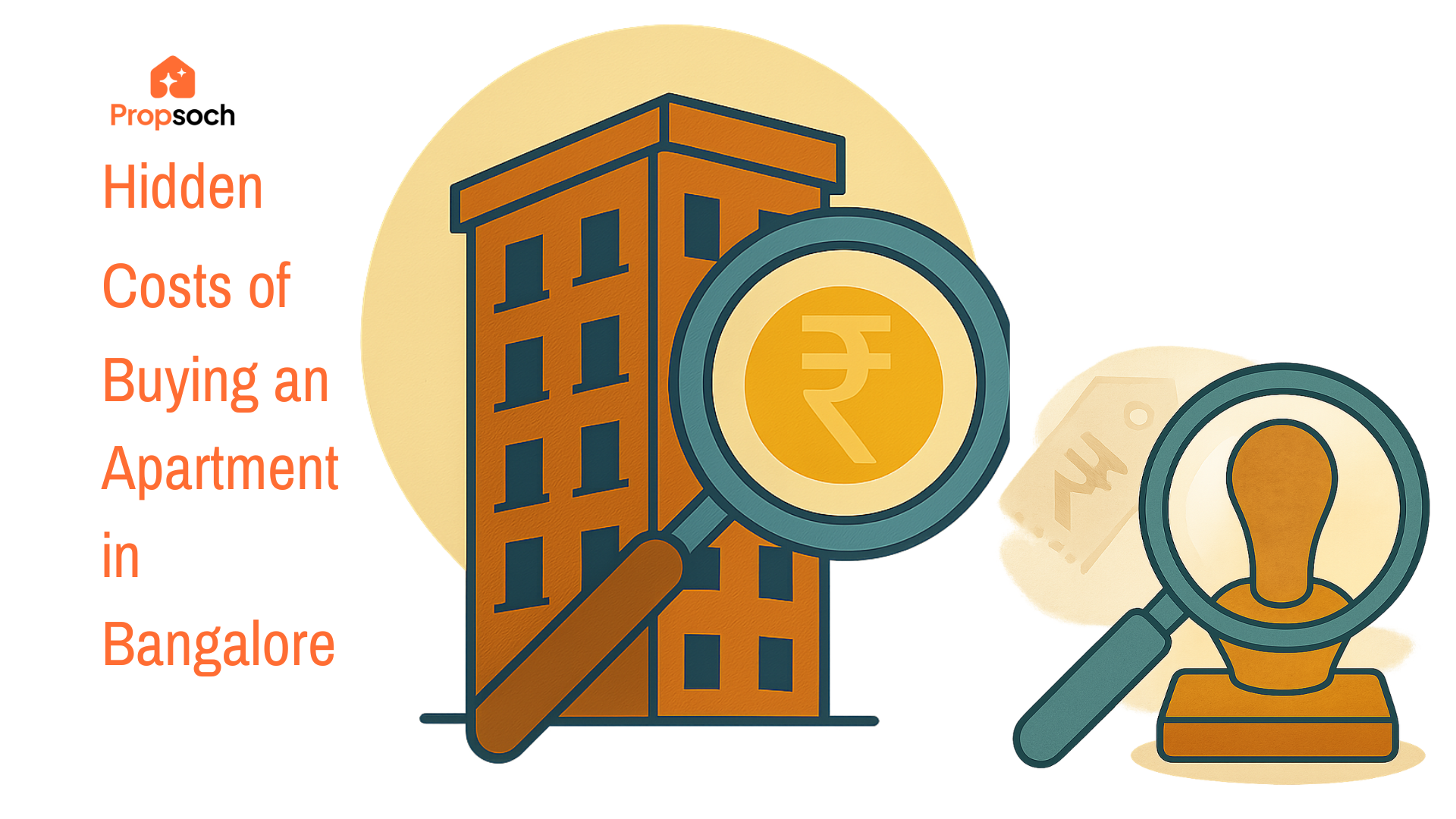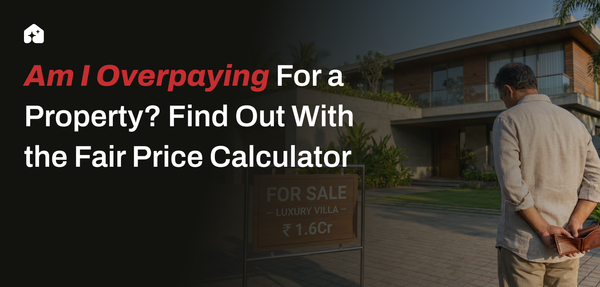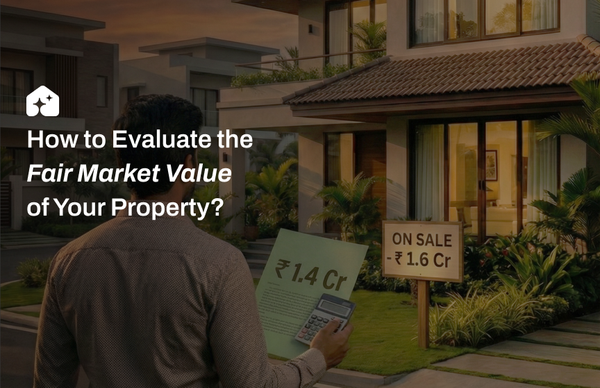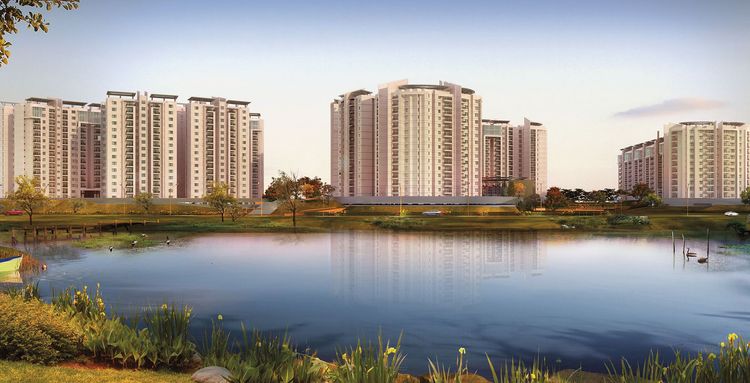Key Takeaways
- Introduction
- Total Cost of Buying a Flat in Bangalore
- Hidden Costs of Buying Apartment In Bangalore
- Floor Rise Charges
- Parking Charges
- Clubhouse and Amenities Charges
- Meter Installation Charges
- Home Loan Processing Fees and MOD Charges
- Agreement Document Charges
- GST on Under-Construction Property
- How much Extra Should You Budget?
- Final Words
- FAQs
Most homebuyers in Bangalore start their search with a fairly clear budget. You shortlist a few options, maybe get a home loan pre-approved and expect the numbers to stay within a certain range. But by the time you reach the agreement stage, that ₹1.2 Cr apartment has somehow turned into ₹1.35 Cr and no one really explains how.
This usually happens when you're buying directly from the builder, not in the resale market. In these cases, there are a bunch of additional charges that don’t show up in the brochure or pricing sheet. These include everything from floor rise fees and clubhouse charges to parking costs, GST and legal documentation fees.
And that’s just the builder side of things. If you're taking a loan, banks and housing finance companies often add their own hidden layers: processing fees, insurance add-ons, MOD charges and technical evaluation fees, all of which can catch first-time buyers off guard.
This blog explains it all. If you're planning to buy a new apartment in Bangalore, this blog will help you understand the true cost of homeownership so you can budget better and avoid any last-minute surprises.
Total Cost of Buying a Flat in Bangalore
As discussed above that the final amount you pay is often 10-20% higher than what’s advertised. That’s because the process involves many additional costs that are not always mentioned upfront. And unless you're aware of these charges early on, you may either go over budget or feel blindsided during the final stages of booking.
Some of these expenses are standard and mandatory, like:
- Stamp duty and registration fees (6.67% of the property value in Bangalore)
- GST (5% on under-construction properties)
- Legal and documentation charges
- Development & Infrastructure Charges
Others vary by project and developer and can sneak up on you:
- Floor rise charges (common in high-rise buildings)
- Clubhouse and amenity charges
- Corpus fund, advance maintenance and sinking fund
- Parking costs, which can go up to ₹8-10L in luxury projects
- Power and water connection charges
- And in some cases, even generator backup and solar infrastructure fees
For homebuyers using a loan, there are also bank-related costs to consider, like:
- Processing fees
- Legal and technical valuation fees
- And even hidden mortgage-related charges buried in the agreement
Hidden Costs of Buying Apartment In Bangalore
1. Floor Rise Charges
Floor rise charges are an extra cost the builder adds for flats on higher floors. Higher floors offer better views, quieter interiors, more privacy and less pollution and people pay for that.
- Common norm: floor rise charges usually start from the 2nd or 5th floor onwards, depending on the project. For example, at Birla Evara, they charge ₹15/sq.ft per floor above the first.
- In other luxury projects in Bangalore, builders may charge anywhere between ₹20 to ₹100 per sq.ft per floor, based on demand, elevation benefits and project location.
What Does It Mean?
Let’s say:
- You’re choosing a 1200 sq.ft apartment on the 10th floor.
- The builder’s floor rise rate is ₹30/sq.ft per floor above 5th, i.e., ₹30 × 5 = ₹150 extra per sq.ft.
- Total floor rise premium = ₹150 × 1200 = ₹1.8 Lakh added to your base price.
That means a flat advertised at ₹1.2 Cr could actually cost ₹1.218 Cr or more, only because you’re on the 10th floor.
Tips for Buyers in Bangalore
- Always ask for a floor rise rate before booking to know exactly how much extra you're paying per floor.
- Assess value for money if the “high floor premium” outweighs practical benefits like view or ventilation, reconsider or opt for a lower floor.
2. Parking Charges
In many projects, parking is sold separately even if you're buying a flat. This can range from ₹2 lakh in mid‑segment projects to ₹10 lakh or more in luxury developments.
RERA rules state that open or stilt parking cannot be sold separately, as they are considered common property. However, rooftop or basement slots may be sold as optional add-ons. Recent rulings in Karnataka have fined builders for charging buyers extra for parking spaces promised in their agreements, affirming buyers’ rights if it was part of the sales deal.
Annual Society-Level Parking Charges & GST
- Once your apartment is handed over, the society may levy annual parking charges, especially for guest or second vehicle parking.
- Please note that if you’ve already paid for the parking, there are no additional charges. However, if it’s open or stilt parking, then these charges may apply.
- If the society's total collections exceed ₹20 lakh per year, GST at 18% may be charged on parking fees unless bundled in exempt maintenance charges.
What’s the Real Cost to a Homebuyer?
- One-time parking cost at booking: ₹2 L-₹10 L depending on segment.
- Annual parking or guest fees: ₹1,000-₹5,000/year per slot depending on BBMP zonal classifications.
- Potential GST on society parking fees: 18%, if applicable under law
What Buyers in Bangalore Should Do
- Ask for parking policy before booking. Know whether parking is included, optional or extra.
- Check Sale Agreement closely. If parking was promised and then charged separately, you may have legal rights.
- Clarify society bylaws. Make sure guest parking charges or second slots are officially approved.
- Ask about GST applicability. If the society crosses threshold, separate parking charges may attract GST.
3. Clubhouse and Amenities Charges
Most apartments in Bangalore come with a clubhouse, pool, gym or indoor games area. But having these features doesn’t always mean they’re free, many buyers don’t realise there’s often an extra upfront cost (or higher maintenance later) tied to these “free” facilities.
Common Charges Buyers Face
- One-time Club Membership Fee: Some projects charge ₹50,000 to ₹5 lakh or even more (depending upon how premium the project is) during booking for clubhouse access.
- Higher Maintenance Cost: Even if no fee is charged upfront, amenities increase monthly charges, often ₹0.5 to ₹1.5/sq.ft extra per month.
Why Builders and Societies Do This
- Marketing appeal: Amenities are key selling points and often priced in separate line items.
- Operational cost: Gym equipment, landscaping and pool upkeep require ongoing funds, often greater than standard maintenance.
- Selective use: Amenities like tennis courts or event halls might be charged separately to manage usage and maintenance better.
What Happens After Possession
- Your monthly maintenance often increases once the project is complete. In developments like Purva Aerocity, buyers pay one-year advance (₹65+/sq.ft) and then ₹4-5/sq.ft/month in maintenance, part of which goes to clubhouse upkeep.
- Some amenities may get restricted over time or need booking, leading to extra fees or limited access.
4. Meter Installation Charges
According to BWSSB rules introduced in May 2020, apartments with three or more homes must have internal water meters for each flat. Here’s how it typically pans out:
- Cost per apartment: Around ₹8,000-₹15,000, depending on the number of inlets and whether retrofitting is needed.
- Smart/IOT meters: ₹4,000-5,000 for the device + ₹500-1,000 installation per unit.
Electricity Meter Charges: What to Prepare For
When moving into a new apartment, many buyers assume electricity permissions and meter installation are free. Often they're not:
- BESCOM registration fee: ₹50 per unit to start a new domestic connection.
- Fixed charges: Around ₹25 per kW for basic load + ₹35 per kW for additional load.
- Meter and infrastructure charges: Recent rulings indicate buyers are responsible for BESCOM meter costs, even if authorities are conducting replacements or maintenance.
Quick Cost Estimate Table
Key Tips Before You Sign
- Ask if meter installation is included in the quoted cost or a separate charge.
- Get estimates from your society or builder before booking your flat.
- Understand what type of meter you’ll get, mechanical, digital, smart and whether ongoing maintenance or app subscriptions apply.
- Check who owns and manages the meter: builder, society, or city utility?
- Note that higher floors may cost more, BWSSB sometimes increases stamp duty and deposit slightly based on floor level too.
5. Home Loan Processing Fees and MOD Charges
When applying for a home loan, it’s easy to overlook the non‑EMI costs but they can add a lakh or two to your total outflow. Two charges that often come as a surprise are the processing fee and the MOD (Memorandum of Deposit) charge.
1. Home Loan Processing Fee
- What it is: A one-time fee paid to the lender for processing your application, verifying documents and sanctioning the loan.
- Typical range in India: 0.35% to 0.5% of the loan amount, plus 18% GST. Some lenders cap it at a flat ₹3,300 or ₹5,000, especially for salaried borrowers at HDFC or SBI.
For example:If you take a ₹50 Lakh loan, at a 0.5% fee + GST, you're paying around ₹30,000 upfront.
2. MOD Charge (Memorandum of Deposit / MODT)
- It’s proof that you're pledging your property documents to the bank as security, essentially transferring partial ownership until full repayment.
- Typical in Karnataka: Ranges from 0.1% to 0.5% of the loan amount (not property cost) with some banks like SBI charging an additional 0.1% for registering it with the sub-registrar (making it 0.6%).
What Buyers in Bangalore Actually Pay
Handy Tips for Bangalore Buyers
- Get all fee estimates in writing, including processing fee, legal/valuation fee and MODT.
- Cross-check if processing fee is refundable upon rejection or early repayment.
- Ask if MODT rate is fixed and whether it includes the registered version (0.6%).
- Negotiate aggressively as some banks waive processing fees or absorb small parts of MODT in competitive cases under ₹1 Cr.
- Consider balance transfer options post-possession to reduce MODT on under-construction loans.
6. Agreement Document Charges
When booking an apartment, you'll typically sign an Agreement to Sale with the builder.
What Is an Agreement to Sale?
This is a legally enforceable contract between buyer and developer. It outlines:
- The agreed sale price
- Timeline for construction and possession
- Penalties or refunds if deadlines aren’t met
This document must be legally stamped and registered before the home loan is sanctioned or ownership transferred. It’s not the final sale deed, but it’s legally binding and your first proof of intent.
Agreement Charges & Stamp Duty in Karnataka
In Bangalore, the stamp duty and registration for the agreement document depends on whether possession has been promised or not:
- With possession: Stamp duty is 5% of market value + 1% registration fee
- Without possession (under‑construction): Stamp duty is 0.1% of consideration amount, capped at ₹20,000; registration fee is still ₹20.
For standard under‑construction flats, buyers typically pay 0.1% of booking amount (e.g. ₹20,000 on a ₹20 lakh booking) plus nominal registration.
Franking & Notary Charges to Expect
Banks require the agreement to be franked or electronically stamped before processing home loans. Your consent or delay here can stall the process. Charges include:
- Franking cost: Typically 0.1% of the document value or ₹200-₹20,000 depending on the value.
- Notary fee: Usually ₹100-₹200 for each signature/witness required (per Bangalore norms).
Tips for Bangalore Homebuyers
- Ask for a breakdown of stamp duty vs franking vs registration vs notary before paying.
- Compare bank requirements, some waive the franking fee as part of offer promotions.
- Keep documentation receipts and photos, especially for franking and filing at the registrar.
- Understand transfer vs agreement values, mistakes can lead to higher charges or penalties later
7. GST on Under-Construction Property
Most buyers don’t expect taxes when booking a flat until the builder hands over a first invoice that includes GST. While this isn’t a hidden fee per se, if you're unaware and thinking of the flat price as final, it feels like one.
Why GST Applies Only on Under‑Construction Homes?
- GST is charged on any flat before a Completion Certificate (CC) is issued but once the property is fully constructed or resale, GST doesn’t apply.
- Builders treat the sale as a "service" in the under‑construction phase and hence GST applies, typically on two‑thirds of the property value (excluding the land part).
Applicable GST Rates in 2025
Developers can’t claim ITC under these residential plans so they pass the reduced flat GST rate to buyers directly.
For Example
If booking a ₹60‑lakh flat as standard residential (not affordable category):
- Taxable value = ₹60 L × 2/3 = ₹40 L
- GST = 5% of ₹40 L = ₹2 LThat ₹2 L comes on top of the base price.
Common Confusion
- Yes, GST is included even if you're paying in installments, the builder collects at each stage and issues GST‑compliant invoices (including your GSTIN if applicable).
- GST is not applied on land value, only on the construction portion so ensure that your tax slab applies correctly.
Tips for Bangalore Homebuyers
- Ask the builder upfront about GST: whether 1% or 5% applies and whether it's included in the quoted price or extra.
- Ensure the builder issues GST-compliant invoices, not just simple receipts.
- If the project qualifies as affordable housing (≤ ₹45 L and capped carpet size), 1% GST applies, confirm this before booking.
- Ready-to-move-in units or resale flats (with OC) attract no GST, only stamp duty and registration.
- Beware of JDA-based developments where GST liability later shifts to the buyer. Recent court rulings may increase costs if GST wasn’t paid at original launch stages
How Much Extra Should You Budget?
Here’s what a typical homebuyer in Bangalore can expect:
On a ₹1 Cr Property, You Could End Up Paying ₹1.15-1.20 Cr
Let’s break down what these extra costs might look like:
Note: These vary by project, location, and developer. Premium projects, especially in South and East Bangalore, tend to have higher one-time charges upfront.
Final Words
There’s a big difference between the price you see on the brochure and what you actually end up paying. At Propsoch, we’ve spoken to homebuyers who felt blindsided by these extra costs. Not because they didn’t ask the right questions but because no one told them what to ask.
If you’re house hunting right now, before you book anything, just have a quick conversation with our team to help with the breakdown of the total cost, what’s fair and what you should clarify with the builder.
FAQs
What should I check before purchasing a flat?
Before buying a flat, check if the property has all its legal approvals: RERA registration, building plan sanction, occupancy certificate (for ready properties) and title ownership. Apart from documents, pay close attention to hidden charges, timeline for possession and builder reputation. A site visit and neighbourhood research also go a long way.
What is the biggest cost after buying a house?
It depends, but most homeowners say it’s maintenance charges and interiors. While registration and stamp duty are one-time expenses, regular monthly maintenance fees, especially in premium projects can go as high as ₹8-₹12 per sq. ft. You’ll also need to budget for furniture, modular kitchen and other finishing work.
What are MOD charges in a home loan?
MOD stands for Memorandum of Deposit of Title Deed. It’s a legal document stating that your property papers are with the bank as loan security. MOD charges in Bangalore can range from 0.1% to 0.3% of the loan amount and are usually paid at the time of loan disbursement.
Are the hidden costs the same across all states in India?
Not exactly. While many charges are common (like registration, GST, parking etc.), the rates differ by state. For example, stamp duty varies, it’s around 5% in Karnataka but different in Maharashtra or Tamil Nadu. Local builder practices and government rules also influence the final cost.
Are there any exemptions or discounts on stamp duty or registration?
Yes. Some states offer stamp duty concessions for first-time homebuyers, women buyers or affordable housing segments. In Karnataka, for instance, women buyers pay slightly less in stamp duty. But these offers are often time-bound or come with specific eligibility.









